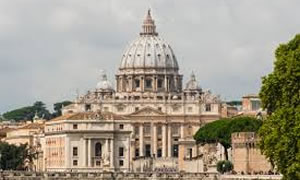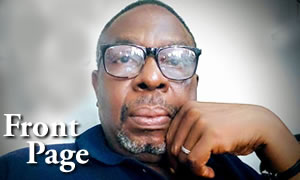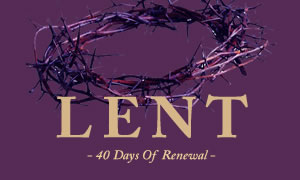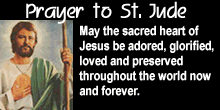


 The term Christian has become so diluted that the phrase, "I am a Christian" has very little precise meaning. The person making such an assertion could be identifying himself as anything from a liberal who believes little of traditional Christianity to a fundamentalist who holds to a strict biblical literalism. This lack of definiteness has largely occurred because of the fragmentation of Western Protestant Christianity. So many groups exist, all of whom claim the title "Christian," that it's nearly impossible for an outsider (or even an insider) to determine what precisely defines one! The problem has been compounded by some theological liberals, who claim the title "Christian," and yet believe little or nothing that is traditionally identified with Christianity. Being Catholic should identify us as above the whole fray. I agree with Pacian of Barcelona who wrote: "My name is Christian, my surname is Catholic" (1). Given the numerous denominations, the word Catholic, especially today, is necessary to explain the word Christian. However, it seems that even the word "catholic" is losing its unique meaning and is becoming disconnected from the Church and Faith that defined it.
The term Christian has become so diluted that the phrase, "I am a Christian" has very little precise meaning. The person making such an assertion could be identifying himself as anything from a liberal who believes little of traditional Christianity to a fundamentalist who holds to a strict biblical literalism. This lack of definiteness has largely occurred because of the fragmentation of Western Protestant Christianity. So many groups exist, all of whom claim the title "Christian," that it's nearly impossible for an outsider (or even an insider) to determine what precisely defines one! The problem has been compounded by some theological liberals, who claim the title "Christian," and yet believe little or nothing that is traditionally identified with Christianity. Being Catholic should identify us as above the whole fray. I agree with Pacian of Barcelona who wrote: "My name is Christian, my surname is Catholic" (1). Given the numerous denominations, the word Catholic, especially today, is necessary to explain the word Christian. However, it seems that even the word "catholic" is losing its unique meaning and is becoming disconnected from the Church and Faith that defined it.
This article is not intended to be a judgment on anyone. God's plan of salvation is a mystery that is more amazing than our human minds can ever imagine. This article is intended to call all people to live in the fullness of the Catholic Faith, not make particular judgments on anyone's current situation or struggles.
Many people, often in groups outside of the Catholic Church, associate being Catholic only with aesthetics or externals. Having ornate churches, flowery liturgies, beautiful vestments, statues, smells and bells, etc., although excellent aids to worship, do not make a person or a group Catholic. Many of us are naturally aesthetes, but worship is not about aesthetics. Worship is about giving praise and adoration to the living God. Beautiful externals can help that worship or they can hinder it. Externals help us when they point to God; they hinder worship when the focus becomes about the externals alone. Externals can often turn into a nice cover for unbelief. Without theology and faith behind the externals, the externals themselves become either idolatry or superstition.
Thinking vestments look pretty, liking the smell of incense, taking an interest in Gothic architecture, or enjoying the study of historical documents no more makes a person a Catholic than drinking coke or reading Western novels makes one an American. Some Protestant groups that have made their worship services more liturgical and beautified their churches, while still holding on to Protestant theology, incorrectly assume that they have become "catholic" simply because their liturgies and buildings resemble that of Catholics. In many mainline Protestant churches the worship has stylistically and aesthetically moved closer to Catholic and Orthodox worship, while theologically they have moved in a more modernist direction. However, Catholicism is more than aesthetics (although these matter)! One must have the true Faith and the Church behind the externals or the externals lose their transcendence. However, a greater interest in the externals is not really a bad thing, since it can lead people to explore the theology and practice of the Catholic Church. The Church invites all who love earthly beauty to enter into the fullness of Beauty only God can offer.
One word that has entered into American (and Western) vocabulary recently is "cafeteria Catholic." This term is a huge contradiction, much like someone saying he is a "democratic dictator." The very nature of Catholicism excludes any sort of "pick and choose" system of belief. As the Catholic Catechism notes: "the word catholic means 'universal,' in the sense of 'according to the totality' or 'in keeping with the whole'" (2). Theoretically, a person can be a Christian, simply a follower of Christ, and not believe everything related to the Christian faith, but the very definition of the word "Catholic" excludes a buffet approach to theology and morals. The final arbiter for Catholics is the Magisterium, which represents the infallible Church's voice on moral and theological matters. Being Catholic involves deferring to the infallible voice of the Church.
This is what separates Catholics from Protestants since Protestant Christianity values the supremacy of the individual in religious interpretation. Although the Bible is the final source for Protestant theology, it must be interpreted. Thus, the final say ultimately belongs to the individual or small religious communities apart from the teachings of the catholic or "whole" Church. For example, most conservative Protestants will deny the perpetual virginity or the doctrine of purgatory, yet chide liberal Protestants for denying the Virgin Birth or allowing abortion. Although the content is different, both liberal and conservative Protestants have essentially decided what is optional and what is not. It just happens that conservatives have drawn the lines at the Virgin Birth and abortion while liberals have gone further. Ultimately both Protestant conservatives and liberals reject essential parts of the Catholic faith based on personal or local community judgments.
Unlike "cafeteria Catholicism" or Protestantism (which is really an older form of cafeteria Catholicism since the Protestant reformers were hugely indebted to Catholic thought), Catholicism without an adjective brings one into the fullness of belief and morality. Although Western Christians are used to individualism, the Catholic Faith has always stressed that the Faith and the Church stand in judgment against our personal beliefs, not the other way around. Even the word "heretic" (hairetikos) comes from the Greek word "to choose" (haireo), i.e. a person chooses not to submit to the Catholic Faith. One deviation often leads to more and more rejection. It's no coincidence that Protestants have been at the forefront of liberal theological movements like Unitarianism ever since. By asserting the primacy of individual judgment, the original Protestant Reformers unleashed schism on top of schism, the results of which (thousands of denominations) would no doubt horrify them. In fact, on issues like the perpetual virginity of Mary and birth control, the original Protestants would no doubt be shocked at the theological departures of their descendents.
Western Christians (sadly including many Catholics) sometimes get indignant at the thought of full submission to the Church, but submission to the Catholic Faith, as many (including this author) have found is truly liberating. For one thing, as even the early Church Fathers noted, there is no salvation outside of the Catholic Church. And salvation from our sins is about as liberating as possible! Many people don't fully submit because they have the minimalist mindset, preferring just to get by. But that is far inferior to experiencing the fullness of the Catholic Faith. Stanley Hauerwas, ironically a Methodist, wrote the following in his 1995 Sermon "Reformation is Sin:"
In contrast [to Protestants], Catholics do not begin with the question of "How much do we need to believe?" but with the attitude "Look at all the wonderful stuff we get to believe!" Isn't it wonderful to know that Mary was immaculately conceived in order to be the faithful servant of God's new creation in Jesus Christ! She therefore becomes the firstborn of God's new creation, our mother, the first member of God's new community we call church. Isn't it wonderful that God continued to act in the world through the appearances of Mary at Guadalupe! Mary must know something because she seems to always appear to peasants and, in particular, to peasant women who have the ability to see her. Most of us [i.e. Protestants] would not have the ability to see Mary because we'd be far too embarrassed by our vision (3).
The secular West puts individual judgment above all, but the Catholic Faith puts the judgment of the Church above all. Thirty some thousand different churches attest to the limitations of private judgment. There may have been a few popes during crises in the Catholic Church, but the Reformation led to millions of Popes, all infallible in their own minds.
Another term that has become popular in recent times is "practicing Catholic" or the obverse, "non-practicing Catholic." Practicing Catholic is redundant, like saying a fire-fighting firefighter. "Non-practicing Catholic" is, like "cafeteria Catholicism," a total contradiction of terms. Being Catholic is more than just mentally assenting to all that the Church teaches, but also living and participating in that teaching. The Catholic Faith is a way of life, or better, a way of orienting one's life to the glory of God and the building up of his holy Church. We are not expected to perfectly practice all the Church teaches all the time, but we are at least obliged to believe it and struggle to live it.
Living and believing the Faith may be difficult at times, but the Catholic Church is a mother to her members throughout their lives, nurturing them, guiding them, and even disciplining them with the fullness of grace she has to offer. From birth (baptism) until death (last rites), the Catholic Church is there for her members. Catholics are baptized at birth and confirmed as warriors for Christ at a later point (or immediately after infant baptism in the case of Eastern Catholics). We have confession when we commit mortal sins or want to grow in holiness. We partake of the Body and Blood of Christ weekly, which strengthens us in our faith, forgives our venial sins, helps keep us from mortal sins, and is the greatest mystery where we intimately meet our Lord Jesus Christ. For those called to the priesthood there is ordination and for those called to marry, the Church unites them and God gives them the grace to live their vows. Even at death, the Church sees her children off to the Lord with the last rites. The Church is with us through it all. Jesus said he would not leave us comfortless and he fulfilled his word. The Holy Spirit works in our lives through the Church.
Living the Catholic Faith also means keeping Catholic morality. Some people see this as legalism or holding to outdated values, but nothing is further from the truth. Catholic (and Orthodox) morality is not arbitrary or burdensome. Rather, it is how we should live to please and glorify God. It also represents the way we were created to live. Not following God's laws leads to not only spiritual, but also temporal or natural consequences. Let's take sexual activity outside of marriage. Although some secularists in the 1960s promoted this as liberating and progressive, who is going to liberate society from out of wedlock births, millions of abortions, fatherless children, astronomical divorce rates, the STD and pregnancy crisis among teenagers, and the general breakdown of the family? Suddenly, God's commands don't seem so burdensome and oppressive, but actually beneficial and liberating!
However, those who struggle with habitual sins or temptations to immorality in the Catholic Church are not left to their own devices or limited to secular options (although many times secular treatments are necessary, but always in conjunction with the Church). The Catholic Church offers confession, which is a vehicle for forgiveness, a source of grace for future struggles, a session for pastoral advice, and a method of accountability. On top of that, Catholics have the grace of all the Sacraments, especially the Eucharist, which helps keep us out of mortal sin. Those in the Catholic Faith also have the treasury of prayers, sacramentals (like the rosary or holy water), the powerful intercession of the Saints, and the many apostolates. Someone who struggles with a sin or moral defect, if he wishes, has the full benefits of the Church behind him in his struggles. Nothing outside of the Catholic Faith can offer this fullness.
So, submission to the Catholic Faith isn't a horrible experience, but rather a wonderful one, because without that submission a person cannot receive the innumerable benefits that come from being Catholic! It may seem difficult at first for people in Western, secular, Protestant societies, but being in the ark Holy Catholic Church is far preferable to embracing the tempest of the secular world, even if the Catholic Church does have its own share of problems (which we do). The Catholic Church (and the local priest) knows that we are not perfect and no one is going to live for God all the time. That's why the Church has confession! However, it's also important that we don't redefine sinfulness to fit modern fads or because refraining from sins is difficult. That's why I agree with Chesterton in wanting a church that is not only right when the world is right, but is right when the world is wrong.
So, what about individuals not in the Catholic Church? Can they be saved? How does the Catholic Church view them? We don't deny that other Christians are saved and can be even within their own communities. Still, salvation for Protestants ultimately comes from the fullness of grace and truth God entrusted to the Catholic Church (4). The Catechism discusses the position of Catholics and non-Catholics in God's plan:
All men are called to this catholic unity of the People of God...And to it, in different ways, belong or are ordered: the Catholic faithful, others who believe in Christ, and finally all mankind, called by God's grace to salvation."
Fully incorporated into the society of the Church are those who, possessing the Spirit of Christ, accept all the means of salvation given to the Church together with her entire organization, and who - by the bonds constituted by the profession of faith, the sacraments, ecclesiastical government, and communion - are joined in the visible structure of the Church of Christ, who rules her through the Supreme Pontiff and the bishops. Even though incorporated into the Church, one who does not however persevere in charity is not saved. He remains indeed in the bosom of the Church, but 'in body' not 'in heart.'
The Church knows that she is joined in many ways to the baptized who are honored by the name of Christian, but do not profess the Catholic faith in its entirety or have not preserved unity or communion under the successor of Peter. Those who believe in Christ and have been properly baptized are put in a certain, although imperfect, communion with the Catholic Church. With the Orthodox Churches, this communion is so profound that it lacks little to attain the fullness that would permit a common celebration of the Lord's Eucharist (5).
Dominus Iesus reiterated many of the above points, asserting that the true Church of Christ is present in those Churches not in communion with Rome that possess apostolic succession and a valid Eucharist (6). This is why recent Popes have sought closer ties with the Orthodox and Catholic policy allows them to receive Holy Communion under certain circumstances (in theory, because the Orthodox as a rule do not allow their members to commune).
Churches that lack apostolic succession and valid Eucharists are in a different position. They are not considered churches in the proper sense, but their members can still be incorporated into Christ through baptism. Thus, their Christianity and even catholicity, however limited, derives from the Catholic Church. They share some communion with her, although it is an imperfect one (7). Although Protestant churches or individuals may agree with large parts of the Catholic Faith, receiving the fullness of that Faith means fully submitting, that is believing in everything and being in visible communion with the Catholic Church.
Thus, Catholicism is so much more than popular terminology assigns to it. It is about believing in and living the fullness of what God has to offer. It is about submitting to Something (and Someone) infinitely greater than ourselves. It is about knowing that we are connected to Something holy, true, good, beautiful, something outside of our own selves and our current time period and culture. The Catholic Faith is within all those spheres (since we live in those spheres), but transcends them all. I'll end this article with the words of St. Augustine (d. AD 430):
"This (i.e. the Catholic Church/Faith) hath been brought to pass by the Divine Providence, through the prophecies of the Prophets, through the manhood and teaching of Christ, through the journeys of the Apostles, through the insults, crosses, blood, of the Martyrs, through the praiseworthy life of the Saints, and, in all these, according as times were seasonable, through miracles worthy of so great matters and virtues. When therefore we see so great help of God, so great progress and fruit, shall we doubt to hide ourselves in the bosom of that Church, which even unto the confession of the human race from [the] apostolic chair through successions Of Bishops, (heretics in vain lurking around her and being condemned, partly by the judgment of the very people, partly by the weight of councils, partly also by the majesty of miracles) hath held the summit of authority. To be unwilling to grant to her the first place, is either surely the height of impiety, or is headlong arrogance (8).
Footnotes
1. From His First Letter to Sympronianus against Novatianism, Volume II, pg. 459.
2. Catechism of the Catholic Church, #830
3. Quoted in Pontifications blog, http://pontifications.classicalanglican.net/index.php?p=293 .
4. Catechism of the Catholic Church, #819.
5. Ibid, #836, 837, 838.
6. Dominus Iesus,(http://www.vatican.va/roman_curia/congregations/cfaith/documents/rc_con_cfaith_doc_20000806_dominus-iesus_en.html).
7. Ibid.
8. On the Profit (or Advantage of Believing),


I have been thinking a great deal about my experience at Reconciliation this past Saturday. I felt an intense and unexplainable urge to go and confess my sins when I woke up that morning. I try to go every six weeks or so, but this was no routine visit to the priest for me. I needed to unburden myself of the numerous venial sins I had committed since I last participated in this Sacrament.
Purest Gold: God's Refining Fire in our Lives »
After salvation, many young Christians wonder if there's anything more to their newfound faith than just the security blanket of "being a Christian." Time and time again, God shows himself as a "refiner," and our lives are as gold. God started leading me in this study to understand what He was doing in my life, as well as in the lives of others.
Picking up my pen to write this column, I couldn’t imagine how time flies. Since the last publication of this column I have gone through a lot, especially the loss of my dear mother to whom I dedicate this article. Not only her, but seems I lost a whole generation of my close family.
How to Achieve Business Excellence »
“Do you see a man who excels in his work? He will stand before Kings; He will not stand before unknown men.” Proverbs 22:29
Spiritual Development for our Youth »
Most of us youth in today's fast moving world are easily thrown off by difficulties and worries.
The theme of conversion is a thread that runs all through Lent, but conversion takes on different aspects throughout the phases of Lent. The first two and a half weeks focused on the interior turning of hearts; the liturgy urges the faithful to reflect and examine consciences thoroughly.
Saint Josephine Bakhita »
Feast Day: February 8
Patron Saint Of: Sudan
Saint Josephine Margaret Bakhita was born around 1869 in the village of Olgossa in the Darfur region of Sudan. She was a member of the Daju people and her uncle was a tribal chief. Due to her family lineage, she grew up happy and relatively prosperous, saying that as a child, she did not know suffering.
Catholics Must Fast More Intensely This Lent»
The Norbertine Canons of St. Michael's Abbey have created this digital Lenten retreat so that you can journey through this holy season alongside them. If you want to have one of your best Lenten seasons yet, join us in our Lenten Program "The Great Fast" - https://theabbotscircle.com/the-great-fast-join
When Your Faith Is Put to the Test - Bishop Barron's Sunday Sermon»
Friends, we come now to the Second Sunday of Lent, and we’re on both dangerous and very holy ground with the first reading from the twenty-second chapter of Genesis. The ancient Israelites referred to it as the “Akedah,” which means the “binding”: Abraham binds and is ready to sacrifice Isaac at God’s command.

Copyright © 2002-2024 THE BEACON INTERNATIONAL CATHOLIC MAGAZINE. All rights reserved.
another mc.rufus interactive web design